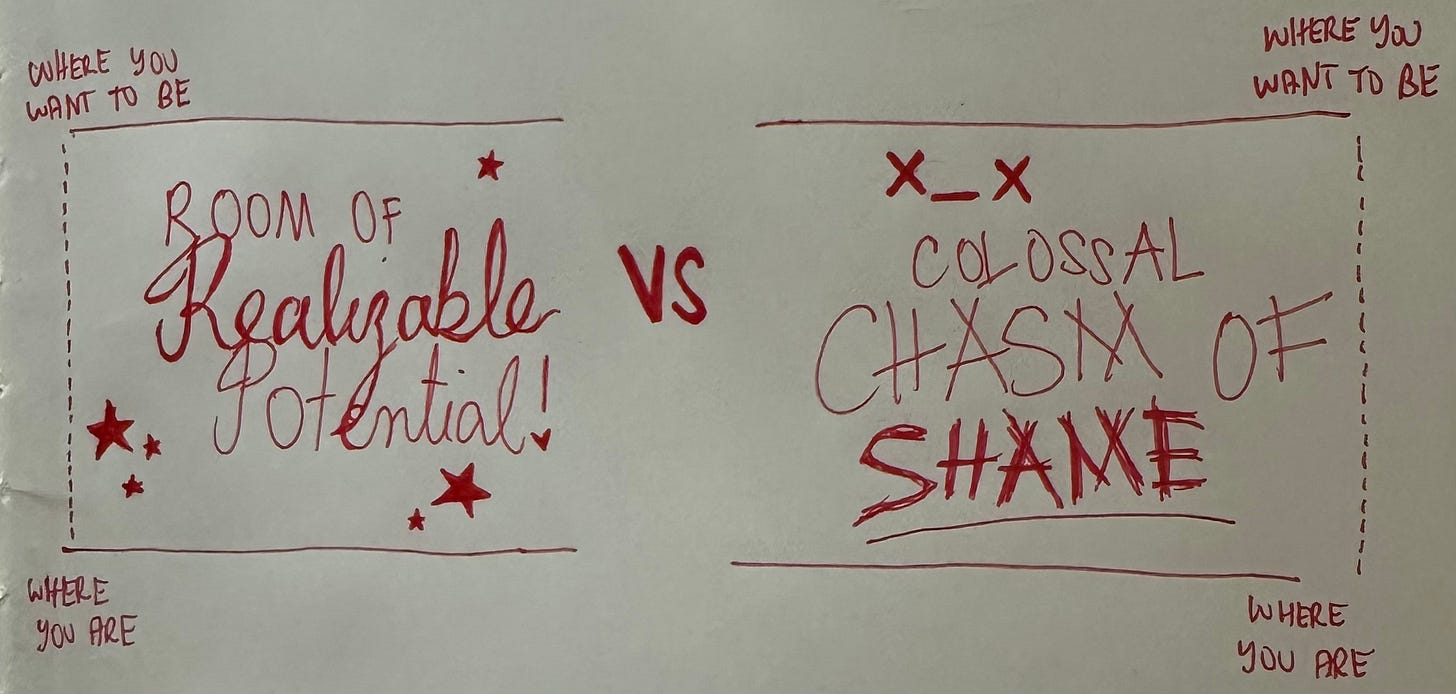#42 The Art of Giving Yourself Grace
Grace, like light, is a stunning duality: it is gentleness and strength at the same time
A junior colleague and I were debriefing a presentation when she, eyes cast downward, said, “I’m trying to give myself grace”.
Our clients were dissatisfied with the presentation, and so was my colleague with herself. New to the brief, she was still familiarizing herself with it. But altogether, the whole team struggled and groped our way through solving it. Still, she felt bad thinking that despite her best efforts, she failed to manage the way she hoped she would.
It’s a hard pill to swallow: even if we give something our best shot, we still miss the mark.
When that happens, how do you extend yourself grace?
How do you stop reprimanding, judging, punishing yourself for falling short of expectations, whether they’re someone else’s or your own? How do you give yourself a break or cut yourself some slack or stop beating yourself up or be kind to yourself or whatever it is they say to console you?
When I began writing during the pandemic — unemployed, stuck indoors, with all the time in the world — I fired out as many as four posts weekly. Today I struggle to publish one newsletter in a month. It’s depressing to think about: how much slower I am now. What happened?
The first adjustment occurred when I started Job A. After four months of unobstructed writing, I was back to having a 9-to-5, albeit working remotely. I dialed it down to two posts per week.
Then came my creative crisis (or writer identity crisis?), where I felt the call to write differently. Self-help just didn’t excite me anymore, didn’t stretch me in the way I felt like I needed to be stretched as a writer. So I transitioned into personal essays or creative non-fiction or whatever it is you call what I’ve been writing, changed writing platforms while I was at it, all while acclimatizing to Job B. Lots of changes, yes, but I was adamant to commit to what I convinced myself was a generous pace: One post per week.
Meanwhile, as the pandemic eased up, I mysteriously found myself pushing 30, facing an onslaught of invitations to very big, very real, and very committal adult milestones: weddings, bachelorette parties, despedidas, housewarming parties, 30th birthday parties (all in real life!). As my calendar filled with arguably critical social obligations, I now had even less writing time. Still, I insisted: ONE post per week. I mean I just had to PUSH MYSELF! Right?!
In my attempts to sustain this pace, one of these three things would happen weekly:
I would publish something short for the sake of sticking to my cadence, which did not feel fulfilling knowing, deep inside, I wanted to write longer, more personal, or more in-depth things
I would push myself to produce a longer, more personal, more in-depth thing, write under pressure trying to make my Sunday deadline, hit publish despite knowing it wasn’t ready to be published, and consequently feel worse about myself
I would end up not publishing at all then quietly chastise myself for being a hopeless piece of shxt
Today I’ve moved on to Job C — a rather cerebral role where I have to digest and synthesize information and ideate and practice deep work regularly. I go to the office once or twice a week. This new role coincided with yet another: becoming a dog mom. For the first time. Let’s just say it has been a precipitous learning curve.
I’ve had to (begrudgingly) reduce my weekly newsletter to a bimonthly newsletter. But all things considered, the pace honestly still feels unmanageable. And any way I look at it, whether I’m comparing myself to my previous self or other writers, I can’t help but think:
I’m not publishing or writing enough.
I’m not pushing myself enough.
I’m not trying hard enough.
I am TIRED. Of negotiating with myself, feeling like a failure, and constantly berating myself for not doing more.
So I thought: WHAT IF I tried something different? Something radical and uncharacteristically me? All this pushing wasn’t working, after all, so WHAT IF… I just stopped? What if I simply admitted that the pace I can honestly sustain is one post per month?
Naturally, this admission first felt like defeat. Like I was settling or giving up on challenging myself.
But this turned out to be exactly what I needed. Now, I feel so relieved. When I write, I feel more buoyant, more clear-headed, more joyful.
I hadn’t known that all this time, I’d been writing with this tremendous weight on my shoulders.
That weight, I realize now, was shame.
Think of a time when you fell short of expectations. You probably thought: “I wish I could’ve done more" or “I wish I could’ve known better” or “I wish I could’ve been someone equipped to meet, if not exceed, expectations.”
The thing about the phrase “I wish I could’ve” is that it’s pretty much interchangeable with another all-too-common toxic phrase: “I should’ve”. Try it. It still works — and feels — the same way, doesn’t it?
That’s because this kind of self-talk is rooted in the same spirit. The spirit of shame.
Shame takes energy. It takes up precious mental and emotional space. It sucks you into a vortex of overbearing pressure and self-loathing and intimidation that’s paralyzing you, clouding your judgment, and weakening your resolve. It’s the overweight luggage you’re hauling around and slowing you down. It’s a pair of binoculars built to zoom into your own sense of inadequacy.
Shame is the inevitable result of being too hard on ourselves. And when shame rears its ugly head, it distorts the way we perceive the gap between our current selves and desired selves, between where we are and what we have yet to achieve. It turns what would’ve been the Room of Your Realizable Potential into the Colossal Chasm of Shame where all the shoulds fester, siphoning all the energy that could have otherwise been directed at what needed to be done.
But more critically, shame distorts our reality by belittling it.
Shame belittles the fact that you’re new to a project and still learning the ropes, thereby rendering you unable to create the sharpest, smoothest presentations. Shame belittles your obligations as your cancer-stricken mother’s caretaker, a role that’s making it impossible for you to hustle it out as a creative freelancer. Shame belittles your difficulties as a first-time mom juggling parenting with work. Shame belittles the seasons and transitions of your life and all the inner work they demand of you, causing you to slow down and recalibrate.
Shame belittles the stark difference between your life then and your life now. It belittles your eagerness to grow, your reliable efforts, your sincere best.
As for me, shame doesn’t care about my creative crisis. It doesn’t care about my career changes or my understandably shifting priorities. It doesn’t care about my peace of mind. Or my gut instinct. Or my deepest motivations as a writer — experimentation, deliberate practice, the delicate balance and symbiosis between living and making art — and how I can align my life with those motivations.
Shame doesn’t care about our nuanced now.
At the end of the day, shame is the force that’s keeping us from doing the work that’s most fundamental to growth: meeting ourselves right where we are.
Because the truth is: our reality — our skill level, resources, bandwidth, and constraints — is our reality. When I finally recognized and sat with mine (something I’m still doing as I write this), I realized I had to stop expecting from myself more than what I could reasonably give. Untethered from that pressure I finally saw that I could make my reality work with me, instead of against me, and that I was the best judge of what was the best, most truthful, most workable approach to my goals.
Now that I’m no longer trying to produce at the rate that I don’t have, I can focus on making what I do have work for me.
J.K. Rowling put it this way: “I stopped pretending to myself that I was anything other than what I was and began to direct all my energy to finishing the only work that mattered to me.”
Among Google's definitions of grace, my favorite is from the Cambridge Dictionary: “a willingness to be fair and to forgive.”
We often think of grace as something we extend to ourselves in the face of our shortcomings. Something we grant for self-absolution: the willingness to forgive, per Cambridge. But what I’m latching onto now is this part: “the willingness to be fair.”
To give ourselves grace is to bravely look at the facts of our lives and, even more bravely, be fair to ourselves. We owe this to ourselves every day.
Grace isn’t cutting yourself slack, but curating the space and support you genuinely need to grow. It isn’t taking it easy on yourself, but doing the hard and courageous work of meeting yourself where you are. It isn’t surrender, but liberation — from the shackles of shame, freeing you to finally do you. It isn’t an afterthought, but a daily practice.
Grace is what makes it possible for you to see the truth of your life in all its nuances, and the truth of yourself in all your potential. Because grace is like light, stunning in its duality: it is gentleness and strength at the same time.










Absolutely beautiful! Thank you for writing and sharing this, Ria. :)
I loved reading this Ria!! Super relate to this shame of not producing enough, and the liberation of giving yourself grace. Thank you for sharing this ✨